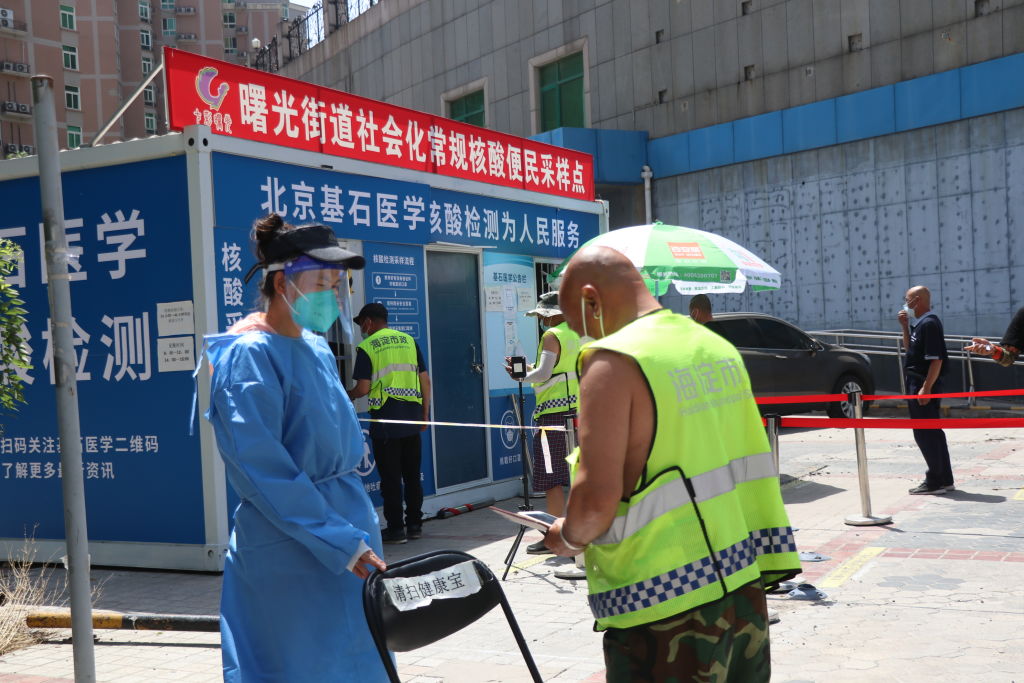
China’s capital Beijing will loosen mobility curbs in several districts from Sunday after authorities said its outbreak is under control, while total case numbers in the financial hub of Shanghai continued to decline.
Most public transportation services including buses, subways and taxis will resume in three districts including Chaoyang, according to Xu Hejian, a spokesman for the Beijing city government. Shopping centers outside of controlled areas in the city will also be allowed to reopen with capacity limits on the number of people. Chaoyang is home to Beijing’s central business district, most foreign embassies and expatriates.
The number of new infections has fallen for six straight days in Beijing with no cases outside of quarantine reported on Friday, Xu said. “This round of outbreak has been effectively controlled,” he said at a briefing Saturday.
Community spread is a key metric used by government officials to determine the severity of an outbreak and whether to ease restrictions. Other cities like Shanghai also began unraveling lockdown measures after reporting consecutive days of zero cases in the community.
Workers in some Beijing districts who were required to work from home previously will be allowed to return to their workplaces, and hotels and hostels in five districts on the city’s outskirts will be permitted to reopen, Xu added.
China’s Li Gives Dire Growth Warning in Unpublished Remarks
The city reported 12 new local cases for Saturday as of 3 p.m., compared with a peak of almost 100 earlier in the wave, as health authorities stamped out most clusters in their early stages. Still, officials in the capital warned of challenges in trying to eradicate the spread of virus, which has persisted for more than a month.
“Beijing is on a key stage of shifting from an emergency response to the virus outbreak to handling the situation on a more regular basis,” Xu said. “The risk of a resurgence remains and we still need to consolidate the prevention work.”
Schools and kindergartens will remain suspended in the city and university campuses will stay closed, with students urged to go home before the summer holidays, Xu said. Dining-in will still be banned at restaurants, he added.
Shanghai logged a total of 170 infections for Friday, one of which was found in the community through regular mass testing, health officials said in a statement. Its total daily case count has steadily trended down over the past week.
Persistent infections found among people not in quarantine underscore the challenge Shanghai faces in keeping the virus in check after more than a month of punishing lockdowns. Under China’s Covid Zero strategy, authorities have taken drastic measures to quarantine all those infected and isolate people exposed to them — in some cases all residents of an entire apartment block — to prevent the virus from spreading.
Why China Is Sticking With Its Covid Zero Strategy: QuickTake
The city on May 17 reached its goal of no new Covid infections in the broader community for three consecutive days, a crucial milestone that authorities said would allow them to start unwinding lockdowns. In the past week, however, isolated cases have been reported, the most recent on May 25.
There were 264 local cases reported nationwide for Friday, including 193 people with no symptoms, according to a statement from the National Health Commission.
More Must-Reads From TIME
- The 100 Most Influential People of 2024
- The Revolution of Yulia Navalnaya
- 6 Compliments That Land Every Time
- What's the Deal With the Bitcoin Halving?
- If You're Dating Right Now , You're Brave: Column
- The AI That Could Heal a Divided Internet
- Fallout Is a Brilliant Model for the Future of Video Game Adaptations
- Want Weekly Recs on What to Watch, Read, and More? Sign Up for Worth Your Time
Contact us at letters@time.com